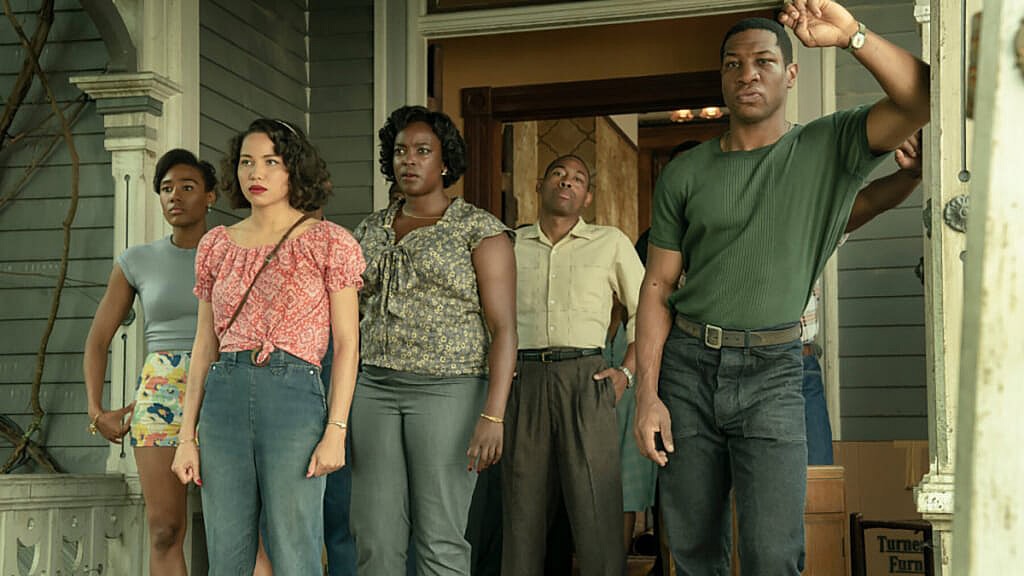In the 2017 blockbuster Get Out, there’s an iconic scene that features a Black housekeeper named Georgiana, who constantly says “No, no, no” to Chris Washington (played by Daniel Kaluuya) with a manufactured smile. But in spite of her artificial hospitality, she begins to cry while smiling.
Georgiana’s constant reassurance to Chris doesn’t hide the obvious breakdown she is feeling inside. Her bizarre, yet frantic emotions have become viral on social media, as hundreds of users have post GIFs of her signature “no, no, no” cry.
If someone was to ask me how I felt about Them: Covenant, that expression would best describe it. The new Amazon Prime series shouldn’t have been created. To even compare it to the racial horror films of Academy Award winner Jordan Peele is insulting. In spite of it incorporating some aesthetic vibes and a young actress from Peele’s Us, this 10-episode trauma porn is an ambulance-chasing hot mess that none of us asked for, especially now.
Read More: Little Marvin gets real about ‘Them’ on Acting Up: ‘It was not about exploring Black trauma’
Set in 1953, the show follows the Emorys, a Black family who moves to Compton from the South during the Great Migration. As they get adjusted to living in an all-white neighborhood, they are faced with immense racism from nearby residents. Everything — from infant murder, rape, white mob attacks, n-word bombs, and more — takes place in their suburban neighborhood. White people are villains — demonic, sinister, and racist — without anything else to do but terrorize the Black people they encounter.
The entire premise of the show is bent on fantasizing about how evil racism can be in the most grotesque ways. By the time I got to episode 5, I was asked myself, “how in the fuck is this for Black people?”

Emmy-award-winning screenwriter Lena Waithe, who serves as the executive producer of Them, has made it a point to push pro-Black artistry, with an intersectional lens. In Master of None, the hit Netflix show that gave her massive critical acclaim and elevated her career, Waithe centered race and LGBTQ issues in her writing. She has done the same with her current shows Twenties and Boomerang on BET, focusing on the multitudes of the Black experience, while delving into other complex issues.
But with her critically-panned 2019 film debut, Queen & Slim, Waithe prioritized Blackness through a Bonnie & Clyde-esque that ended with its valiant lovers being killed by cops after having the cross country journey of a lifetime. Despite other major flaws with that movie, such as juxtaposing a climactic sex scene during one of civil unrest involving a cop killing, the traumatic ending made the entire film pointless. I felt the same with Them.
First-time showrunner Little Marvin spent more energy on the shock factor of the series, rather than anything substantive. It’s like with each episode, Them was saying “come for the Blackness, but stay for the dozens of bizarre ways we attempt to torture it.”
Read More: Little Marvin says trauma in ‘Them’ exposes ‘true sickness’ of Jim Crow
This pales in comparison to Peele’s horror work, which gave more context behind white rage than simply a reactionary tale. Black characters were empowered with a level of self-determination that made it all rewarding to watch till the end. There’s nothing like the final 15 minutes of Get Out, when Chris gets out of the “Sunken Place,” kicks ass, and makes it out of that damn house alive. Similar victories can be found in shows like HBO’s Watchman and Lovecraft Country, where Black characters faced racial adversity, but that didn’t define the entire premise of their experience on the show.

Them spends too much time trying to put a mirror up to the horrors of white supremacy as if nobody is already aware of its horrors. During a time of racial unrest, an insurrection at the nation’s capital, and the aftermath of four years of Trump — Black people aren’t lacking a reality check of the dangers of white people. Without much rhyme or reason, the show serves more as an exploration of historic Black suffering than anything else. As I watched a brutal scene in which a Black couple is blinded by hot pokers, I again begged the question, “who was this show made for?”
Read More: Little Marvin gets real about ‘Them’ on Acting Up: ‘It was not about exploring Black trauma’
If this was created for white people, the show only depicts them as two-dimensional bad guys who are driven by seeing melanated people living in their lily-white neighborhood. Such viewers could easily feel they have read and watched enough content about racism to find this too far-fetched for them to interpret a deeper message (whatever the hell that could possibly be).
If the intended audience of Them was for Black people, the creators are exploitative AF and disgustingly void of any sensitivity for our wellbeing and care. You can’t say you love Black people and make something like this that seeks to emotionally wreck us during a time of real-life carnage that can’t easily be turned off like the countless times I had to pause this shit.

Them: Covenant is what happens when creators misunderstand a trend and fail to read the room. The new wave of the “Black horror” genre that has been successfully led by Peele was about reimagining the role of Black characters within it. Them does nothing to elevant the power and presence of its Black protagonists, nor does it make the reasoning behind its white villains appealing enough to root harder for the former.
Its vapid, flimsy “it’s Black, so watch it” impression throughout the promotion of the show fell short when it became painstakingly obvious that melanated people were used as props to push a series that only showcased their demise for ten, drawn-out episodes of torture — that was both the nature of the content and viewing experience, respectively.
Even thinking of the time I wasted watching it right now still has me going “no, no, no.”

Ernest Owens is the Editor at Large of Philadelphia magazine and CEO of Ernest Media Empire, LLC. The award-winning journalist has written for The New York Times, NBC News, USA Today and several other major publications. Follow him on Facebook, Twitter, or Instagram and ernestowens.com.
Have you subscribed to theGrio’s “Dear Culture” podcast? Download our newest episodes now!
TheGrio is now on Apple TV, Amazon Fire and Roku. Download theGrio.com today!


